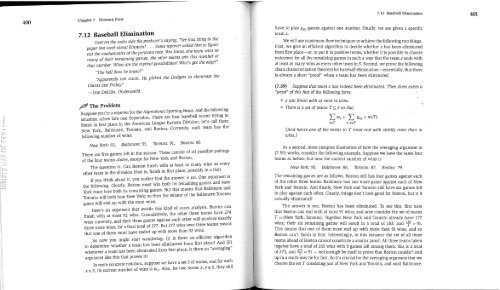Algorithm Design
Algorithm Design
Algorithm Design
Create successful ePaper yourself
Turn your PDF publications into a flip-book with our unique Google optimized e-Paper software.
400<br />
Chapter 7 Network Flow<br />
7.12 Baseball Elimination<br />
Over on the radio side the producer’s saying, "See that thing in the<br />
paper last week about Einstein?... Some reporter asked him to figure<br />
out the mathematics of the pennant race. You know, one team wins so<br />
many of their remaining games, the other teams win this number or<br />
that number. What are the myriad possibilities? Who’s got the edge?"<br />
"The hell does he know?"<br />
"Apparently not much. He picked the Dodgers to eliminate the<br />
Giants last Friday.’"<br />
--Don DeLillo, Underworld<br />
/..~ The Problem<br />
Suppose you’re a reporter for the <strong>Algorithm</strong>ic Sporting News, and the following<br />
situation arises late one September. There are four basebal! teams trying to<br />
finish in first place in the American League Eastern Division; let’s call them<br />
New York, Baltimore, Toronto, and Boston. Currently, each team has the<br />
following number of wins:<br />
New York: 92, Baltimore: 91, Toronto: 91, Boston: 90.<br />
There are five games left in the season: These consist of all possible pairings<br />
of the four teams above, except for New York and Boston.<br />
The question is: Can Boston finish with at least as many wins as every<br />
other team in the division (that is, finish in first place, possibly in a fie)?<br />
If you think about it, you realize that the answer is no. One argument is<br />
the following. Clearly, Boston must win both its remaining games and New<br />
York must lose both its remaining games. But this means that Baltimore and<br />
Toronto will both beat New York; so then the winner of the Baltimore-Toronto<br />
game will end up with the most wins.<br />
Here’s an argument that avoids this kind of cases analysis. Boston can<br />
finish with at most 92 wins. Cumulatively, the other three teams have 274<br />
wins currently, and their three games against each other will produce exactly<br />
three more wins, for a final total of 277. But 277 wins over three teams means<br />
that one of them must have ended up with more than 92 wins.<br />
So now you might start wondering: (i) Is there an efficient algorithm<br />
to determine whether a team has been eliminated from first place? And (ii)<br />
whenever a team has been eliminated from first place, is there an "averaging"<br />
argument like this that proves it?<br />
In more concrete notation, suppose we have a set S of teams, and for each<br />
x ~ S, its current number of wins is wx. Also, for two teams x, y ~ S, they still<br />
7.12 Baseball Elimination<br />
have to play gx~, games against one another. Finally, we are given a specific<br />
team z.<br />
We will use maximum-flow techniques to achieve the following two things.<br />
First, we give an efficient algorithm to decide whether z has been eliminated<br />
from first place--or, to put it in positive terms, whether it is possible to choose<br />
outcomes for all the remaining games in such a way that the team z ends with<br />
at least as many wins as every other team in S. Second, we prove the following<br />
clean characterization theorem for baseball elimination--essentially, that there<br />
is always a short "proof" when a team has been eliminated.<br />
(7.59) Suppose that team z has indeed been eliminated. Then there exists a<br />
"proof; of this fact of the following form:<br />
z can finish with at most m wins.<br />
There is a set of teams T c_ S so that<br />
~ wx + ~ gx~, > mlT[.<br />
x,y~T<br />
(And hence one of the teams in T must end with strictly more than m<br />
wins.)<br />
As a second, more complex illustration of how the averaging argument in<br />
(7.59) works, consider the following example. Suppose we have the same four<br />
teams as before, but now the current number of wins is<br />
New York: 90, Baltimore: 88, Toronto: 87, Boston: 79.<br />
The remaining games are as follows. Boston still has four games against each<br />
of the other three teams. Baltimore has one more game against each of New<br />
York and Toronto. And finally, New York and Toronto still have six games left<br />
to play against each other. Clearly, things don’t !ook good for Boston, but is it<br />
actually eliminated?<br />
The answer is yes; Boston has been eliminated. To see this, first note<br />
that Boston can end with at most 91 wins; and now consider the set of teams<br />
T = {New York, Toronto}. Together New York and Toronto already have 177<br />
wins; their six remaining games will result in a total of 183; and !~ > 91.<br />
This means that one of them must end up with more than 91 wins, and so<br />
Boston can’t finish in first. Interestingly, in this instance the set of all three<br />
teams ahead of Boston cannot constitute a similar proof: All three teams taken<br />
togeher have a total of 265 wins with 8 games left among them; this is a total<br />
of 273, and 273 -T- = 91 -- not enough by itself to prove that Boston couldn’t end<br />
up in a multi-way tie for first. So it’s crucial for the averaging argument that we<br />
choose the set T consisting just of New York and Toronto, and omit Baltimore.<br />
401





